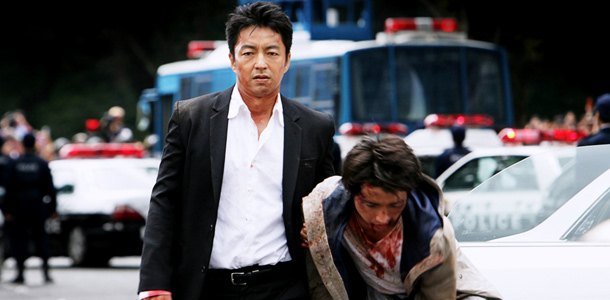Reviews
Shield of Straw | Cannes Review
Burnt Offerings: Miike’s Latest Can’t Quite Reach Satisfying Blaze
 That audacious auteur of excess, Takashi Miike, unveils his latest offering, Shield of Straw to be a surprisingly straight laced police narrative that’s notably unfettered by psychosexual shock value or absurdly grotesque violence. Sporting a generously enjoyable first half hour or so, Miike’s excessiveness instead configures itself in pace deadening repetition, where the film’s central theme is explored, regurgitated and discussed over and over again in every monologue, diatribe, shootout and/or explosion. Which is a pity considering the interest Miike manages to instill in the wan but promising B grade dramatic conflict from a concept we’ve seen before in several variations.
That audacious auteur of excess, Takashi Miike, unveils his latest offering, Shield of Straw to be a surprisingly straight laced police narrative that’s notably unfettered by psychosexual shock value or absurdly grotesque violence. Sporting a generously enjoyable first half hour or so, Miike’s excessiveness instead configures itself in pace deadening repetition, where the film’s central theme is explored, regurgitated and discussed over and over again in every monologue, diatribe, shootout and/or explosion. Which is a pity considering the interest Miike manages to instill in the wan but promising B grade dramatic conflict from a concept we’ve seen before in several variations.
Quickly we learn that the ragged corpse of a young girl seen in the opening sequence belongs to the granddaughter of a vengeful billionaire Ninagawa (Tsutomu Yamazaki), who has used his vast funds to force every major publication in Japan to run an advertisement offering one million yen to anyone that will kill the man who police have identified as the prime suspect. That man is convicted murderer Kiyomaru (Tatsuya Fujiwara), recently released from serving a sentence for a similar crime nearly a decade prior.
Kiyomaru’s former cell-mate quickly becomes the first to make an attempt on the wanted man’s life, forcing Kiyomaru to turn himself over to police custody for protection. But when Ninagawa decides to grant one million yen to anyone willing to even try to kill Kiyomaru, the police quickly realize they are in a sticky situation as now they must transport the suspect to the DA in Tokyo within 48 hours. A unit of secret police are assembled to guard Kiyomaru in the entourage, namely Mekari (Takao Osawa), whose own wife was senselessly killed only three years prior, and his partner Shiraiwa (Nanaku Matsushima), a single mother hungry to prove her merit and secure a fast track promotion. As a ridiculously large caravan of police cars escort the crew to Tokyo, the elite team soon realizes that they face the most danger from within from their own sanctions as their colleagues are all highly skilled and trained killers.
The establishing sequences in Shield of Straw are remarkably rapid, quickly rushing headlong into one dozy of an action sequence that all fits very well into the general formula of how all these things tend to go, but Miike’s certainly got our rapt attention from the starting gate. It’s too bad then that nearly immediately after this we’re continually and perpetually flung into an onslaught of paroxysms concerning leaks as to Kiyomaru’s whereabouts on the way to Tokyo, which means no one can trust one another and motives and integrity issues for each character are discussed repeatedly. Of course, we predictably learn several other rote surprises pertaining to corruption higher up the chain, but nothing can resurrect the film’s initial energy. To break up the stagnant sequences dealing with the film’s blatant messages about greed (a cop remarks towards the onset that taxpayer money is needlessly wasted on the police caravan—touché) Tamio Hiyashi’s screenplay is peppered with oddball moments of ludicrousness, such as a young girl taken hostage in a sequence that goes on far too long, or the father of Kiyomara’s first victim conveniently popping up for some proselytizing.
Ending with about as much corny pizzazz as a made for television series, it’s unclear why this latest Miike feature was selected for Main Competition at this year’s Cannes Film Festival, as it’s basically a nice looking genre rehash of 16 Blocks (2006) and it plays like something one could easily see remade with names like Mark Wahlberg or Olivia Wilde plopped into the lead roles. Based on novel by Kazuhiro Kiuchi, the title’s flashy significance, of course, (like Dearden’s Woman of Straw) is because straw is easy to burn. Too bad that Miike didn’t realize that a languorous, slow burn requires substantial fuel.
Reviewed on May 20 at the 2013 Cannes Film Festival — MAIN COMPETITION.

























